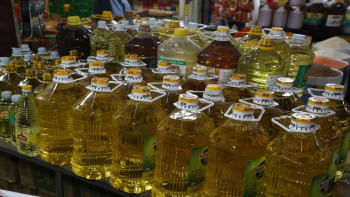6cr Covid shots expected by June

Bangladesh will get six crore shots of Covid-19 vaccines between May and June next year from the COVAX facility, Cabinet Secretary Khandker Anwarul Islam said yesterday.
This will be in addition to 3 crore doses of the Oxford-Astrazeneca vaccine from the Serum Institute of India (SII) that the government expects to start reaching the country between late January and early February, he said referring to Health Minister Zahid Maleque's words in yesterday's cabinet meeting.
Officials had earlier said Bangladesh will buy the first 6.8 crore shots of vaccines under the COVAX facility -- a global initiative coordinated by WHO, GAVI and CEPI -- at a subsidised price ranging from $1.6 to $2.
The Oxford-Astrazeneca vaccines are supposed to arrive in Bangladesh in instalments of 50 lakh doses every month, according to a trilateral memorandum of understanding signed by the Bangladesh government, SII and Bangladesh's Beximco Pharmaceuticals Ltd on November 6.
"We'll get three crore doses of vaccines for 1.5 crore people at the end of January or early February next year and six crore doses for three crore people by May-June next," he told reporters after the cabinet meeting at the Bangladesh Secretariat, reports BSS.
He said there may be "at best one month's delay or advanced delivery" of the vaccine shots from COVAX.
Prime Minister Sheikh Hasina chaired the meeting, joining it virtually from the Gono Bhaban.
On December 13, the government finalised the MoU by signing the procurement contract.
Once the vaccine is approved for human application, Beximco Pharma will buy each dose from Serum for $4 and then supply it to the government at $5 per dose.
The timing of the arrival may not, however, be certain as the SII CEO said recently that it will be available to the general public in India in March-April, while UK's Guardian newspaper reported that the vaccine's approval may be delayed until the beginning of January.
WHEN WILL THE VACCINE ARRIVE?
Pune-based Serum has an agreement with AstraZeneca to manufacture the vaccine, ChAdOx1 nCoV-19, being developed by Oxford University. The vaccine has been named Covishield in India.
While the Bangladesh government has been saying the country will start getting Covishield vaccines by early January or late February, Indian media reported that it may be available by March-April for use by the general public.
On December 7, the Serum Institute of India, the world's largest vaccine manufacturer in terms of volume, applied to the Drug Controller General of India (DCGI) for emergency use authorisation for the Oxford-Astrazeneca vaccine, reports Hindustan Times newspaper.
During a Hindustan Times Leadership Summit on November 19, Adar Poonawalla, chief executive officer of SII, said, "Emergency use authorisation will be for healthcare workers and other frontline workers, and by March-April, the vaccine should be available to the general public."
He said emergency use licensure is based on the positive UK results. "[In the UK] There is a good T-cell and antibody response but nobody at this stage can answer whether these vaccines can protect in the long-term."
The UK's Guardian newspaper said in a report on Saturday that authorisation of the Oxford-AstraZeneca coronavirus vaccine in the UK could be delayed until the beginning of January.
Results from global studies have shown that it can be 90 percent effective in preventing an infection when a person receives a half dose and then a full dose.
Abdul Mannan, secretary of the health services division, said the timeline the government is talking about is based on what Beximco said in a meeting in presence of the representatives of SII.
"What sir [cabinet secretary] said is based on the information we [health ministry] have… Beximco said, in presence of Serum [SII] representatives, that they will supply vaccines to the market by February. As Serum has not told us there will be a delay, we have to stay on the February deadline."
Asked again about the condition of approval of the Oxford vaccines from the World Health Organization, Mannan said, "If that [WHO approval] does not happen, it will not happen anywhere in the world; not just here [Bangladesh], but also in India."
Meanwhile, when a safe and effective vaccine is found, COVAX -- a global initiative coordinated by WHO, GAVI and CEPI -- will facilitate equitable access and distribution to protect people in all countries.
It aims to distribute 2 billion doses of Covid-19 vaccines from several manufacturers by the end of 2021, according to the WHO.
Replying to a question, Cabinet Secretary Khandker Anwarul Islam also said the government is now thinking only of the Oxford vaccine, but would not be rigid about any other vaccine that gets WHO approval.
During the briefing, the cabinet secretary also said the prime minister had directed to implement the "No Mask No Service" policy strictly.
VACCINE STORAGE AND DISTRIBUTION
The training for vaccination has been started and Expanded Programme on Immunisation (EPI) vaccination chain will be engaged massively for the Covid vaccination, Khandker Anwarul Islam said, adding that the vaccine issue was raised during the unscheduled discussion at the cabinet meeting.
To distribute vaccines, the government is close to finalising the National Vaccine Deployment Plan, according to officials.
Dr Shamsul Haque Mridha, director of the EPI, told The Daily Star yesterday, "Currently we have stored 3.5 crore doses of measle-rubella vaccine which is additional to the capacity for the regular vaccines. We will not have any problem in vaccine storage. We are also working to arrange additional back-up storage."
Experts, however, warned that there may be chaos if the plan is not consistent with field-level realities.


 For all latest news, follow The Daily Star's Google News channel.
For all latest news, follow The Daily Star's Google News channel. 



Comments